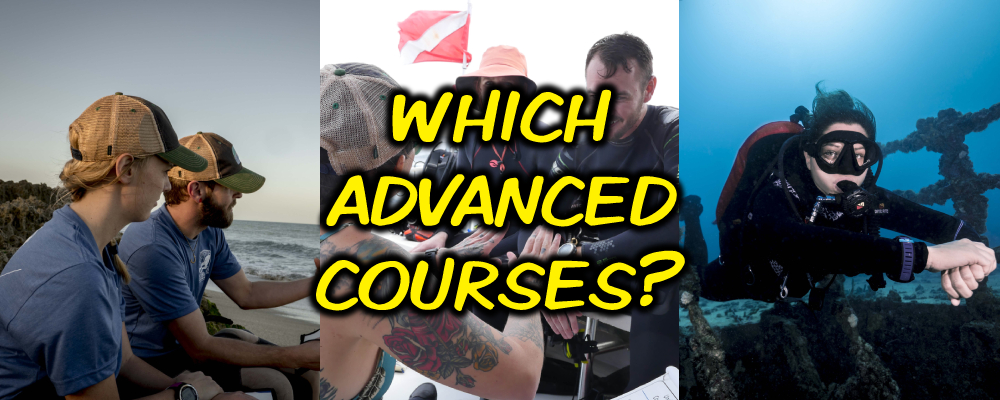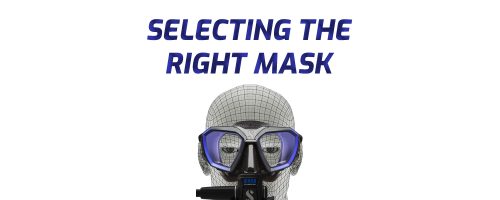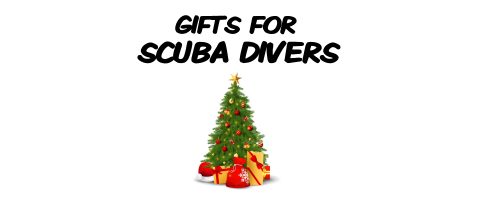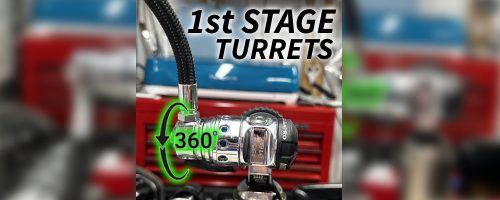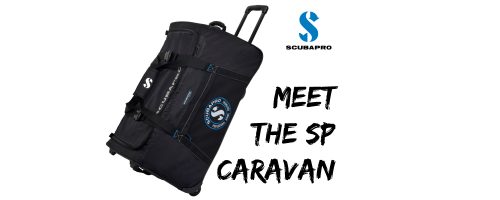advanced courses = diving experience
After a newly certified Open Water SCUBA Diver finishes his/her course. They might be asking themselves what is next. As an employee of Extreme Sports, I would love to sell every new diver an advanced course right after they complete their Open Water. However, this is not the “Extremeology”,as we call it. Our goal is to push divers into diving more, not destroy their wallet. For new divers, we suggest to just GO DIVING! There is no better experience than going diving with your family, friends, or simply meeting new divers and getting wet! We like this method because it can eliminate the need of every diver completing every course.
"those" dive centers
Unfortunately there are a LOT of dive centers that immediately push courses like Nitrox (alternate breathing gas) just a week after an OW certification. This is a great example what is NOT apart of our “Extremeology”. To break down why we wouldn’t do something like this, we’ll explain nitrox first. Nitrox is an alternate breathing gas in which a diver inhales in replace of regular air. The benefits of diving Nitrox are as followed: it reduces surface intervals, increases bottom times, and reduces fatigue. However it is designed to be inhaled during long and SHALLOW dives. Not every diver plans on performing long and shallow dives. Not every diver feels tired after inhaling regular air. On the other hand, there ARE plenty of divers that get tired or want perform dives back to back. This is where we would offer this advanced course. Nitrox is the MOST sold advanced course over the diving industry.
after diving, see what needs improvement
Like I stated above, just GO DIVING! You’ll find out very quickly what needs worked on. Make a list on what you don’t feel confident in or what you’d like to change with gear or form. For example: some of the students we trained over the 2021 season performed amazingly during the buoyancy section their Open Water course. While on the other side, some would definitely feel more confident with some more advanced training.
Our Advanced Buoyancy Control course is a fantastic course for those wanting to boost their confidence and skill with diving. After completing this course personally, I was able to move into other specialties that required near-perfect buoyancy, such as Videography.
Maybe you are that diver that dives repetitively on a dive boat. A diver like this will enjoy the use of Nitrox due to the shortened surface intervals.
Some divers have to do something with their hands while they dive. This can reduce anxiety in those divers who struggle with it. For this I ALWAYS recommend Photography or Videography (yes there is a big difference).
what do you love about diving?
Ask yourself, “what do I love about diving?”. Write this down and make a list of all the different features in which you LOVE about diving; this may assist you in developing your next batch of skills. For example: I love diving wrecks. For me, wrecks almost seem as time that was frozen. Once a wreck was sunk, nothing has changed but the decay of nature. However, I have met many divers with Submechanophobia (the fear or submerged man-made objects underwater). Placing a diver near a fear is obviously something we would love to avoid.
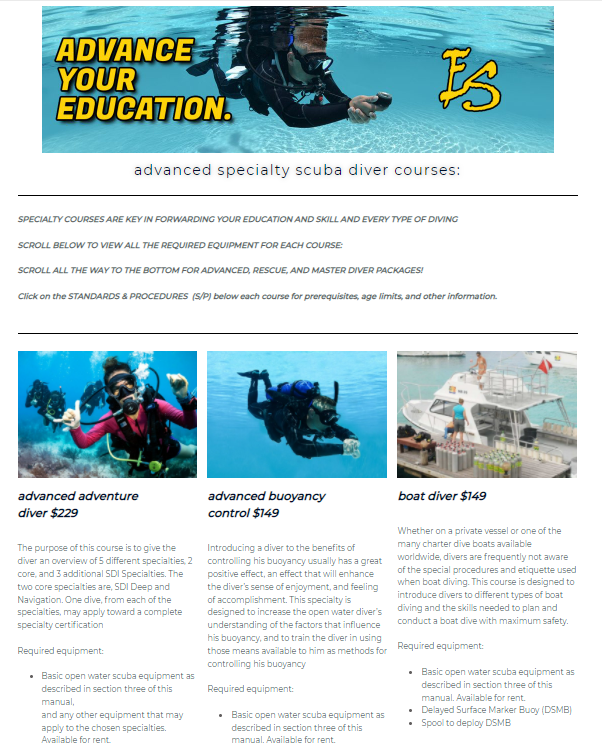
courses we offer:
– Advanced Adventure Diver
– Advanced Buoyancy Control
– Boat Diver
– Computer Nitrox Diver
– Deep Diver
– Drift Diver
– Dry Suit Diver
– Full Face Mask Diver
– Night-Limited Visibility Diving
– Search and Recovery Diver
– Sidemount Diver (Coming soon)
– Underwater Navigation Diver
– Underwater Photographer Diver
– Underwater Videographer Diver
– Wreck Diver
All specialty courses require different levels of equipment for each class. Click on the button above to learn more.
experience
For some, diving is more enjoyable with the education. The training sessions can really expose a divers capabilities underwater, on the surface, and even in the classroom. Understanding situations before they happen and running through mental and physical education will help a diver fathom diving practices.
During the educational process, divers go though physics and biology through EVERY class. For me, this is very enjoyable and come out of each class knowing skills I never thought about. The following graph shows my timeline of the advanced courses I’ve taken. From the left, when I started diving to now. “I’m pretty good but know my limitations”, is a great statement about the ideal “experienced” diver.
professional
The SDI Divemaster Course is the first professional level certification. This course is a great goal for those wanting to be able to assist teaching SCUBA. During the course you will learn how to work with divers, lead certified divers, and act as a dive guide showing divers underwater dive sites and the marine life that inhabits those dive sites, You will increase your knowledge about physics and physiology in diving as well as increase your proficiency with your scuba and your snorkeling skills. This course does not allow you to teach SCUBA diving, but graduates are able to assist an active SDI Instructor during approved diving courses provided the activities are similar to the graduate’s prior training. Graduate’s are also able to supervise and conduct dives for certified divers, provided the activities are similar to the graduate’s prior experience and training.
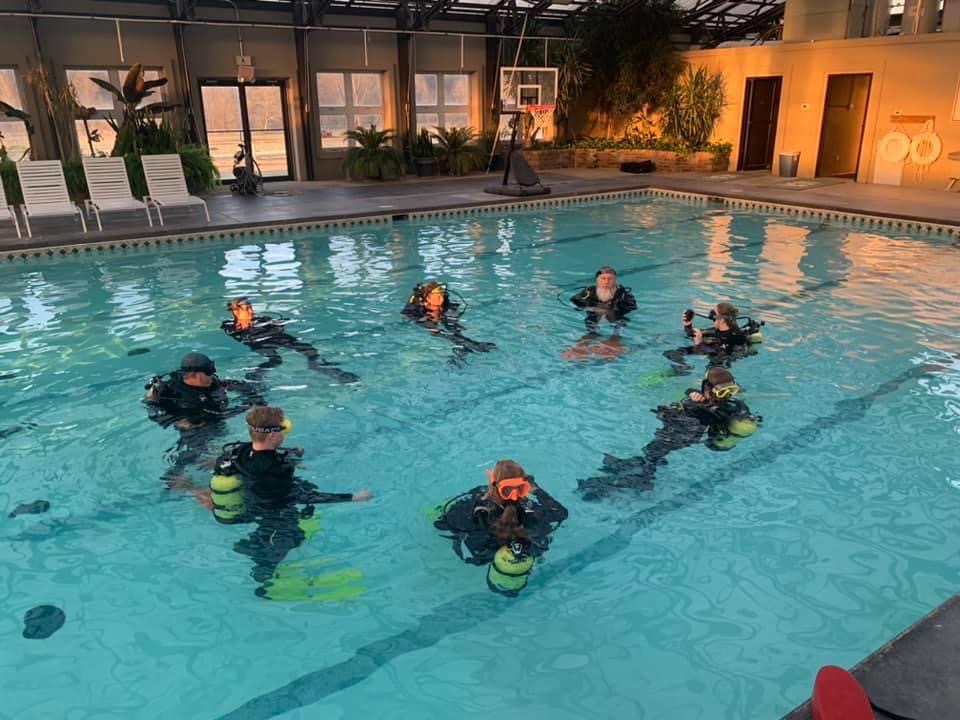
professional courses we offer:
- SDI Divemaster
- SDI Assistant Instructor
For any questions, email me —> drake@westonfamilycompanies.com or call 417-659-9009
other blog posts:
Selecting the Right SCUBA Mask
it’s just important! What is the most important piece of...
Read MoreTop Gifts for Scuba Divers
Our List Scuba divers always have a need for something...
Read More1st Stage Turrets – Why?
Jumping back in history Looking back in time at Scubapro’s...
Read MoreMeet the Scubapro Caravan Bag
before the caravan Through out the years I have traveled...
Read More